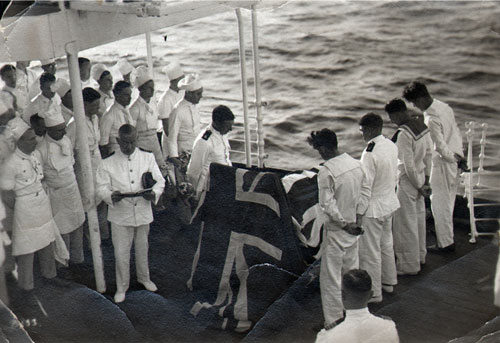Death of Passengers at Sea
It is a mistaken notion to believe that first or second-class passenger who dies at sea are consigned to the deep. In fact, every first-class steamer carries caskets, and the surgeon will embalm the body.
He is entitled to a fee of twenty pounds for so doing. Deaths at sea are few, and bad health should not deter anyone from making the voyage.
Additional Information (1909)
Some steamship companies, when a death occurs from ordinary causes among the steerage passengers and which has been followed by burial at sea, tacitly expect the doctor to protect the corporation's interest by either making out a lax report or by omitting to mention the occurrence altogether in the papers to the quarantine officials.
This saves time and money sometimes, but is perilous, for if the offense is detected, the company is not only heavily fined, but the doctor himself becomes a suspicious character henceforth to the officials.

Death of Passenger on a British Ocean Liner Buried at Sea. GGA Image ID # 17b540bc71
Accounts.—The clerical work which the company and government regulations require from the doctor is such as relates naturally to his professional duties.
His name must be attached to all official papers relating to the health of the crew or passengers. His signature attached places him upon his honor as to the truth of the contents of such indentures.
Rejections of immigrant passengers at the port of embarkation with a statement of the cause must be officially noted by him. Sickness or death occurring among either crew or passengers must also be entered, accompanied by the doctor's descriptive statement.
The replacement of sails by steam, with the consequent shortening of the ocean voyage, has practically eliminated the former abnormally high death rate at sea.
Many of the evils of ocean travel still exist, but they are not long enough continued to produce death. At present a death on a steamer is the exception and not the rule.
Contagious disease may and does sometimes break out and bring death to some passengers. There are also other instances of death from natural causes, but these are rare and call for no special study or alarm.
Donnelly, James Francis, M.D., "Medical Service in the Merchant Marine," in Medical Record: A Weekly Journal of Medicine and Surgery, Volume 75, No. 17, Whole No. 2007, New York, 24 April 1909, P. 690-694
Abstract of the Report on Steerage Conditions by the Immigration Commission, Washington: Government Printing Office, 1910, p. 13.
